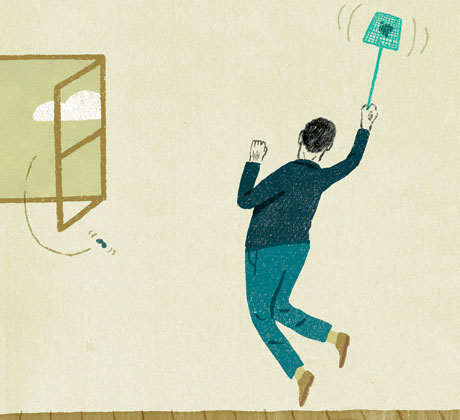
We can all agree, presumably, that learning to appreciate life's smaller pleasures – a sunset, a cup of coffee, the sight of a newborn lamb drinking a cup of coffee at sunset – is a highly beneficial thing. And yet there's something uniquely aggravating about being instructed, whether by books, blogs or well-meaning friends, to savour such moments. Run barefoot through grass, we're urged. Smell the morning air! Relish a piece of chocolate! All admirable, but perhaps the problem is that we must discover our own pleasures for ourselves; perhaps it's that the advice can sound smug. Or perhaps it's just that running barefoot through the park near my house would be a really, really bad idea, unless you're up for savouring the feeling of broken glass, and much worse, against the soles of your feet.
So it's always refreshing to return to the work of the Canadian author Neil Pasricha, proprietor of the blog 1000AwesomeThings.com (he adds a new awesome thing daily, and just reached the halfway point, while a hardback version, The Book Of Awesome, is available in north America or online). A fair number of Pasricha's reflections on everyday sources of happiness, it's true, are of the sunsets-and-lambs variety. But he also has a deep affinity for another category of pleasures, usually neglected by purveyors of pop psychology, which fall under the heading of "relief": the joyous moment an unpleasant experience stops, or when things don't turn out half as badly as you were expecting.
Who'd dissent, for example, from Pasricha's observation that there's weirdly disproportionate enjoyment, when hauling luggage or shopping, in "picking up something that turns out to be a lot lighter than you expected"? Or "dropping your cellphone on the sidewalk and then realising it's totally fine"? Or arriving late for a rendezvous, sweaty and exhausted, only to find the other person's even later? Or, I would add – a slightly different variety of relief – when you get to finish some arduous chore, or an exasperating house guest leaves?
Clearly, this isn't a brilliant strategy for long-term fulfilment: if you're in a terrible job, or terrible relationship, it's no real justification to say it's worth it because it's nice to leave the office each day, or lovely when your partner's not around. "Expect the worst and you'll never be disappointed" is a dispiriting way to live. On a smaller scale, though, it can be a real source of joy, and a pleasingly democratic one: we might not all have the capacity to stop, in the midst of a hellish day, to watch a sunset, but even the gloomiest among us can savour the times our gloomiest expectations are confounded, or our least favourite activities end. Indeed, isn't this one area where being downbeat is actually an advantage? If you're such a cheery optimist that you're happy whatever happens, you'll never know the thrill of having things turn out less terribly than expected.
Recently, Gretchen Rubin, blogger and author of the bestselling Happiness Project, noted that she'd been cheered, one morning, by bagpipes outside her window. At first, I was awed: I couldn't imagine being so good at appreciating the world that I'd appreciate even bagpipes. But then I realised that I, too, am grateful for bagpipe-playing buskers, albeit for different reasons. Because without them, I'd never experience that moment – exquisite, cherishable, infinitely tranquil – when they stop.
oliver.burkeman@theguardian.com

